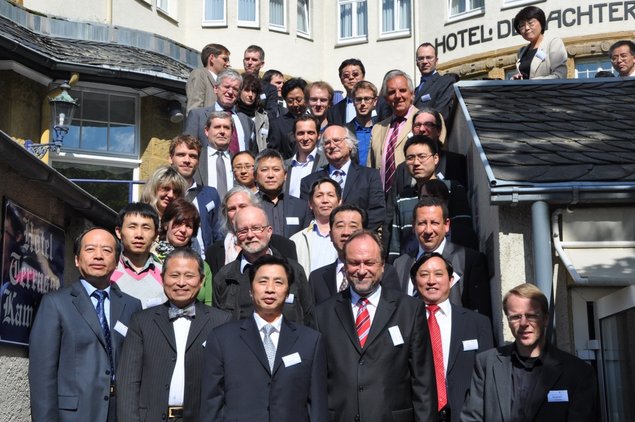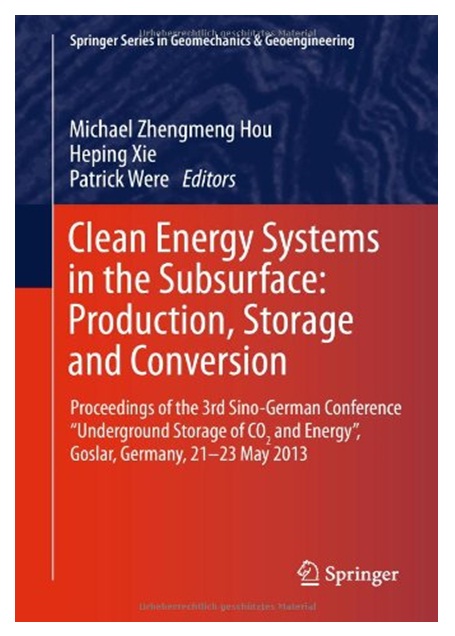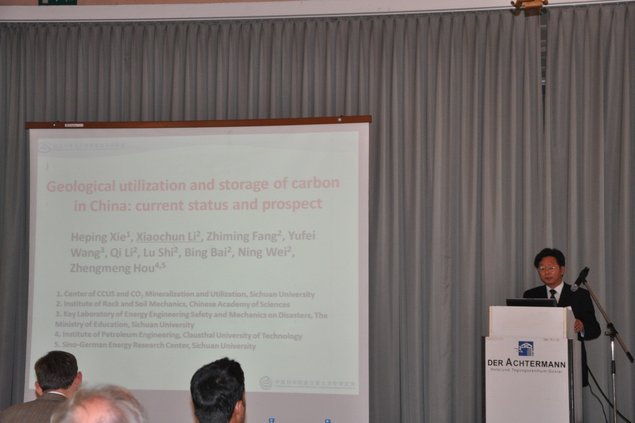Report on the 3rd Chinese-German Energy Conference "Underground Storage of CO2 and Energy"
After the first workshop in Golsar in 2007 and the second conference in Beijing in 2010, the third Sino-German Energy Conference " Underground Storage ofCO2 and Energy" took place in Goslar from May 21 to 23, 2013. This was co-financed by the Sino-German Center for the Promotion of Science (CDZ) as part of the Sino-German Cooperation Group. The conference was jointly organized by Prof. Dr.-Ing. habil. Michael Zhengmeng Hou from Clausthal University of Technology (TUC) and Prof. PhD Dr.-Ing. E.h. Heping Xie from Sichuan University (SCU).
Around 100 scientists, including 65 German, 5 European and 30 Chinese as well as additional students, took part in the conference. Both presidents of the universities TUC and SCU, Prof. Dr. Thomas Hanschke (TUC) and Prof. Dr. Heping Xie (SCU), declared in their welcoming speech that they would like to further intensify the existing cooperation with regard to education and energy research. Mr. Miaogen Zhao, DFG Vice President of the CDZ, gave an overview of the CDZ in his opening speech.
In the course of 25 presentations, the participants were given an overview of the current situation and developments regarding the storage ofCO2 and energy. The main topics of the conference were "Clean energy systems underground: production, storage and conversion".
conversion". These are published in the conference proceedings published by Springer-Verlag and can be accessed via the weblink http://link.springer.com/book/10.1007/978-3-642-37849-2/page/1. A total of 35 papers by 111 authors and co-authors are published in the conference proceedings. In addition, a special volume "Underground Storage ofCO2 and Energy" with 17 further papers will be published in the SCI/ISI journal Acta Geotechnica later this year.
Worldwide energy consumption is still heavily dependent on the use of conventional fossil energy resources - this is the main reason for global warming and climate change. In China, for example,CO2 emissions rose from 2500 Mt in 1991 to over 7000 Mt in 2011, making China the largestCO2 emitter in the world, while Germany is the largest emitter in Europe with 800 Mt per year. In line with the German government's new energy policy, it is planned that Germany will obtain 50% of the electrical energy it needs from renewable sources by 2030 and 80% by 2050. In order to achieve this, we need to find suitable geo-reservoirs that can act both as large storage systems for fluctuating renewable energies and as a damper onCO2 emissions. The development of new technologies such as CCS (CO2 capture & storage) or CCUS (CO2 capture, utilization & storage) can thus create the transition from carbon-intensive fuels to low-carbon fuels such as gas. It would also be conceivable to use the deep reservoirs as biochemical reactors, which could enable the conversion of hydrogen andCO2 to methane under natural pressure and temperature conditions.
In this context, we hope to receive continuous support from the German and Chinese governments and related institutions to create an open platform for long-term international cooperation in the field of energy research and to train talented young scientists. In the future, we will continue to organize similar conferences alternately between Germany and China. The next one will take place in May 2015 at Sichuan University in Chengdu, China. Universities and research institutions from Germany and China are cordially invited to join this open cooperation forum.
There are also plans to apply for a Sino-German Collaborative Research Center/Transregion (SFB/TRR), which could be jointly funded by the National Natural Science Foundation of China (NSFC) and the German Research Foundation (DFG). This SFB/TRR team had its first planning meeting in Goslar on May 23, 2013.
Before and after the conference, excursions were organized to the salt cavern field for natural gas and crude oil in Etzel, the JadeWeserPort in Wilhelmshaven, theCO2 pilot storage project in Ketzin and the German Bundestag in Berlin.
Further information can be found here: http://www.sino-german-energy.de/veranstaltungen/sino-german-conference-2013/


